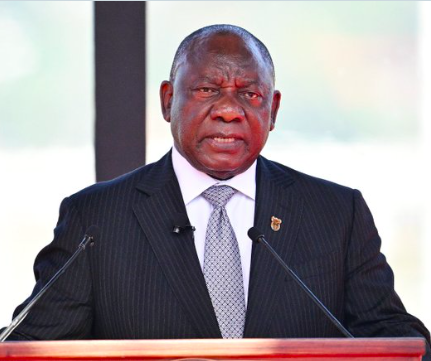Cape Town — President Cyril Ramaphosa said South Africans need to do more to combat the pandemic of Gender-Based Violence (GBV) in the country.
Monday was the start of 16 Days of Activism for No Violence against Women and Children and since the inception of the global campaign, it has gained a ton of support from organisations and activists in more than 187 countries.
In a statement, Ramaphosa said violence against women and children is pervasive, with many women and children being beaten, killed and assaulted in the workplace, homes and places of learning.
“Women and children are supposed to feel most safe within the home. Yet it is within the home where the majority of the world’s victims of gender-based violence die at the hands of men. A new report by UN Women has found that around 60% of victims of femicide in 2023 were killed in a domestic setting by someone close to them,” Ramaphosa said.
Violence against women partners is the most prevalent form of GBV in South Africa, and the root of crimes against women stems from sexism, believing men and boys are better than women and girls, he stressed the importance of addressing the issue that women are the ‘property’ of husbands and boyfriends.
“We must address the economic dimension, where men think they have the right over the bodies of their wives because they are breadwinners, or because they finance the lifestyles of their girlfriends. Many women find themselves trapped in situations of economic dependence, feeling they have to put up with abuse because the alternative is destitution.,” he said.
Just as gender-based violence affects everyone, so too we must all work together to overcome it. We need all community, civic and religious formations to form part of this effort. At this time of activism, we must mobilise businesses, trade unions, academic communities and public… pic.twitter.com/wedHIb46D9
— Cyril Ramaphosa 🇿🇦 (@CyrilRamaphosa) November 25, 2024
He added that many men and boys have been exposed to toxic masculinity in their lives, leading them to think that treating women badly is masculine, and to treat a woman equally or with respect is weak or ‘simping’ (known to be soft or overly-sympathetic).
“Ending gender-based violence begins with changing the narrative. Women’s rights and gender equality are non-negotiable. They are not culturally relative or open to interpretation,” he said.
He applauded the men who have come forward to sign the Pledge for South African Men to End Gender-Based Violence, either in person or online. We encourage more men to make this stand by signing the pledge and through their daily conduct towards women. He said those who remain silent, by not reporting cases of GBV, are complicit in the crimes.
He encouraged schools and workplaces to work hard and enforce rules and laws against GBV to create safe spaces for women.
“At this time of activism, we must mobilise businesses, trade unions, academic communities and public servants to get involved. During this year’s 16 Days of Activism let us continue to work together to make our country safer for women and children,” he said.
According to The Citizen, Police Minister Senzo Mchunu shared the crime stats between July and September 2024, and reported that more than 2 500 women and children were murdered during that time, an avergae of 14 each day.
“GBV, which has become a national priority crime, requires our distinct focus, as it continues to devastate families and communities, with a unique set of challenges that demand specialised intervention, thorough investigations, and collaborative solutions,” said Mchunu.
He said the rise of crimes against women and children needs urgent and sustained action and every South African needs to play their part to combat GBV.
Follow African Insider on Facebook, Twitter and Instagram
Picture:
For more African news, visit Africaninsider.com
Compiled by Matthew Petersen


